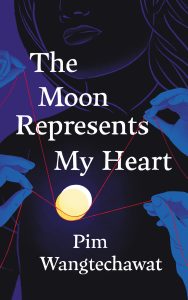Pim Wangtechawat Guest Post–“Time Travel”
It was a few months before Covid hit when the question first came to me: What would happen if one were to become addicted to travelling back in time?
I was living in Edinburgh, Scotland, and recently embarked on a Creative Writing master’s degree course. I was in a strange, reflective period in my life. I found myself constantly dissecting various aspects of who I was and pondering where they’d come from. Most of all, I was ruminating over my past and what I had lost—people I loved who’ve either passed away or are no longer in my life.
I thought a lot about my relationship with my father, and by extension my father’s relationship with his father. Only a few years before, my father had been diagnosed with stage-three colon cancer, which eventually  disappeared after he underwent a surgery and chemotherapy. During that very same period, my grandfather (a Chinese man who immigrated to Thailand in his early twenties) passed away. This rumination happened with an alarming regularity, I felt as if I’d been thrown back into living in the past, stuck and unable to find my way back to my present. Thus, my novel, The Moon Represents My Heart, was born.
disappeared after he underwent a surgery and chemotherapy. During that very same period, my grandfather (a Chinese man who immigrated to Thailand in his early twenties) passed away. This rumination happened with an alarming regularity, I felt as if I’d been thrown back into living in the past, stuck and unable to find my way back to my present. Thus, my novel, The Moon Represents My Heart, was born.
Set in London and Hong Kong, TMRMH tells the story of a British-Chinese family of time-travellers. When the parents, Joshua and Lily, travel back in time and never return, their children, twins Tommy and Eva, are forced to deal with their grief alone. Eva might be trying to find her place in the present, but Tommy is pulled further and further into a past that he hopes holds the truth. When he falls in love with a woman from a different era, his inability to confront his own history has severe ramifications for the people who can truly bring him happiness.
I wrote TMRMH with the main purpose of using time travel to explore themes of grief and loss. As discussed in Joan Didion’s memoir The Year of Magical Thinking, grief can become a character in and of itself, and in storytelling, time-travel the prism through which we view it. TMRMH aims to unpack our relationship with the past: How can we confront it or should we confront it at all? Is there a way for our present and future to outweigh what came before? How can we reconcile ourselves with our history and move forward with hope?
I personally find that the time travel genre is at its best when it is anchored in our humanity. In the Richard Curtis film About Time, the mechanics of time travel are kept vague, with the spotlight trained on the relationship between father and son. Charles Yu’s novel, How to Live Safely In a Science Fictional Universe, takes a slightly more scientific approach, providing readers with detailed explanations of the how’s and the why’s behind the time travel. But the heart of the novel is also the relationship between father and son. In the classic British TV show Doctor Who, the Doctor is a Time Lord who’s spent nearly a thousand years travelling through time and space to save the universe. But so many of his character arcs throughout the years have been defined by his guilt, grief and loneliness.
One of the biggest questions facing time travel is: Can we change the past? As it was with me during that period in my life, it is human nature for us to ponder on what-ifs. (If things had panned out differently in the past, would our present be different? If we could go back in time to change anything, what would we change?) In About Time and Sandra Newman’s novel The Heavens, the protagonists’ actions in the past have drastic consequences; after a trip back in time, they’d return to find their present significantly altered as a result. Newman’s book even goes as far as having the state of the world altering too. Toshizaku Kawaguchi’s novel Before The Coffee Gets Cold, however, uses a completely different approach. In his universe, characters cannot change the past, and there is a time limit on how long you can stay there.
For a long time, I was debating which approach I should use for my novel. But the more I wrote TMRMH, the more I began to discover parallels between characters in the past and in the present, specifically between father and son, and mother and daughter. This wasn’t unlike my own life: I began to see my parents in aspects of who I am, even my grandparents; oftentimes, it felt like I had my own family reflected back to me as I made certain decisions. This was why I had my characters grappling with the possibility that, even with their powers, they might not be able to change the past. Instead, they must figure out a way to live with it.
An episode of television which I drew huge inspiration from was Doctor Who’s “Vincent and the Doctor”. In this episode, the Doctor (played by Matt Smith) and his companion, Amy Pond (Karen Gillian), travel back in time to help Vincent Van Gogh combat an alien monster that’s terrorising him and his community. The more time they spend with Vincent, the more Amy begins to entertain the possibility that they can somehow prevent him from eventually taking his own life. What unfolds in the episode, however, is the complete opposite.
All of these examples speak to how much longing there is in the time travel genre, which I believe is part of the appeal—a longing for a different time and place, for more time with loved ones, for another chance. They encapsulate the main reason why time travel continues to be such a compelling device in storytelling. That despite all the “bells and whistles” of the genre—the spectacle and the thrill of revisiting significant moments in history—we still have to deal with the ramifications of time. That no matter how much we try to wield time against itself, loss and grief are still inevitable.
So what happens next?

Pim Wangtechawat is a Thai-Chinese writer from Bangkok, Thailand. Pim’s short stories, poems, and articles have been published in various websites, literary magazines, and journals, including the Mekong Review, the Nikkei Asian Review, Den of Geek, and YesPoetry. She holds a bachelor’s degree in English Literature from King’s College London and graduated with distinction from Edinburgh Napier University in Scotland with a master’s in creative writing. The Moon Represents My Heart is her debut novel.




